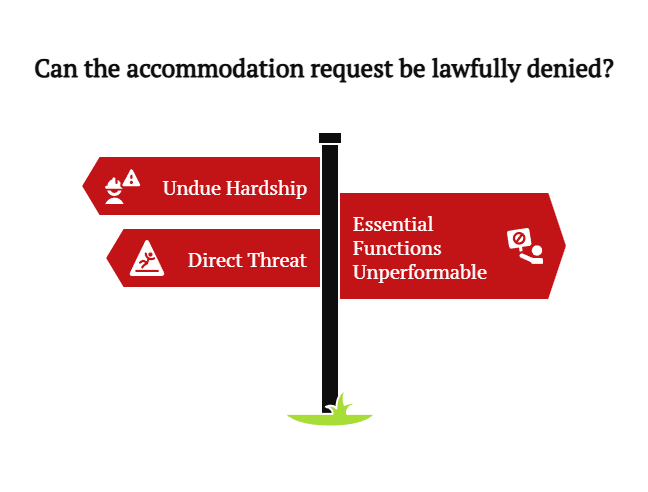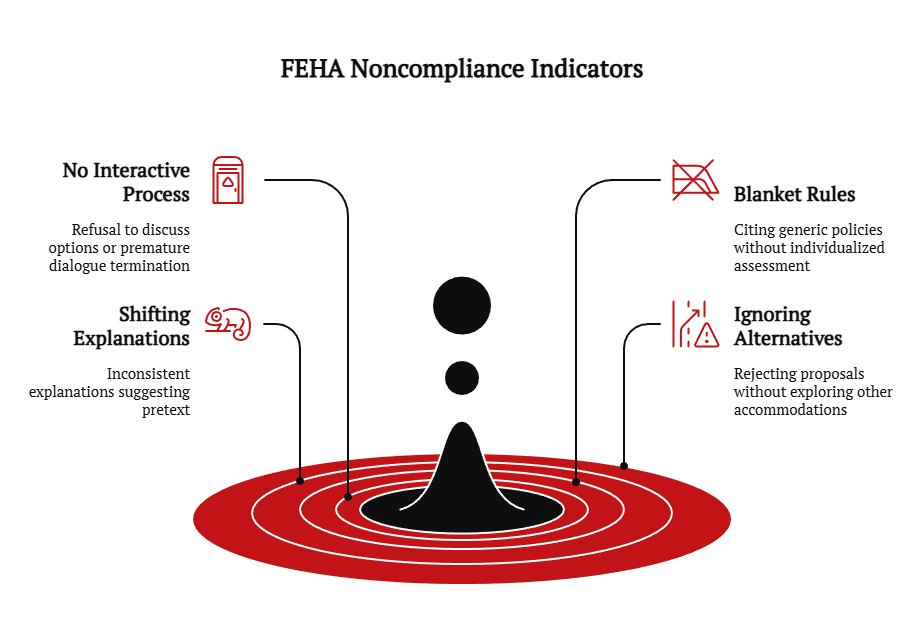📌 Key Takeaways
Denied or ignored after a bodily injury? California law sets clear rules for how employers must handle disability accommodations and the patterns that expose noncompliance.
- FEHA Sets the Baseline: Covered employers (5+ employees) must engage in a good-faith interactive process to identify reasonable accommodations for a disability, and once the accommodation is identified, it must be provided.
- Disability Definition Is Broad: Injury-related physical limitations, including temporary and non–work-related impairments, can qualify as disabilities in California, triggering accommodation obligations.
- Accommodations Must Be Considered: Effective options can include modified duties, schedule changes, assistive equipment, finite medical leave, or reassignment to a vacant role—the governing standard is effectiveness, not convenience.
- Only Narrow Grounds Justify Denial: An accommodation request can be denied based on an undue hardship, the employee’s inability to perform essential functions even with accommodation, or a supported direct threat analysis based on individualized, objective evidence.
Know the rules, recognize the patterns, and understand how FEHA frames your workplace rights in California.
This guide is for Southern California blue-collar workers facing denied light duty, schedule changes, or other accommodations after an injury who want clear, no-jargon insight into employer obligations.
California employers generally must consider reasonable accommodation requests from employees with qualifying disabilities under the Fair Employment and Housing Act (FEHA). A flat “no,” or a refusal to discuss options, may signal noncompliance with FEHA’s duty to accommodate and its requirement to engage in a good-faith interactive process. Because outcomes turn on facts, professional evaluation is crucial.
What California Law Requires Under FEHA
Under California law, generally, covered employers (five or more employees) owe an affirmative duty to provide reasonable accommodation when it would enable performance of essential functions. Laws are subject to change, and individual circumstances vary. California Civil Rights Department (CRD) guidance is the primary state resource for current information.
Reasonable accommodation can be modifications that effectively enable an employee with a disability to perform essential job functions. The standard is effectiveness, not convenience or preference.
What Counts as a “Disability” After a Bodily Injury
Under California law, generally, physical disability is defined broadly. Common injury-related limitations—restricted lifting, reduced standing or walking, limited range of motion—may qualify even when temporary. FEHA protections do not depend on whether the injury occurred at work.
Accommodations Employers Must Consider
Under California law, generally, employers should consider accommodations that are effective in light of job demands and medical restrictions, including but not limited to:
- Modified duties or reduced physical requirements.
- Schedule modifications or shift changes.
- Assistive devices or workstation adjustments.
- Finite time off for treatment or recovery.
- Reassignment to a vacant position when essential functions of the current role cannot be performed even with accommodation.
When a Denial of an Accommodation Request Can Potentially Be Lawful

California’s framework recognizes limited grounds for denial:
- Undue hardship: Significant difficulty or expense relative to the employer’s resources and operations; mere inconvenience is insufficient.
- Essential functions remain unperformable even with accommodation: FEHA does not require elimination of essential duties.
- Direct threat: A significant risk of substantial harm that cannot be reduced by accommodation, based on individualized, objective evidence.
Red Flags for Potential Noncompliance (Illustrative, Not Exhaustive)

Several patterns often raise concerns under FEHA:
- No interactive process: Refusing to discuss options or ending the dialogue prematurely.
- Blanket rules: Citing a generic “no light duty” policy without individualized assessment.
- Shifting or inconsistent explanations: Indicators a trier of fact could evaluate as pretext.
- Ignoring alternatives: Rejecting one proposal without exploring other effective accommodations.
When disputes over accommodations are followed by discharge or forced resignation, the issues can overlap with wrongful termination. Under California law, generally, a causal connection between protected activity and adverse action is assessed case by case by the trier of fact.
Retaliation Risks After Requests
Requesting accommodation is protected activity. Under California law, generally, adverse actions such as termination, demotion, or discipline shortly after a request may raise retaliation concerns—particularly where reasons are inconsistent or comparators without disabilities are treated more favorably. For background on retaliation principles, see workplace retaliation and, for disability-specific issues, disability discrimination.
Illustrative Example
Consider a warehouse employee with a doctor-imposed 20-pound lifting restriction who asks for temporary light duty or assignment to packing. If the employer cites a blanket policy against light duty, refuses to discuss alternatives, and then disciplines the employee for failing to lift heavier items, that pattern may be inconsistent with FEHA’s good-faith, individualized requirements. This is a simplified illustration; real evaluations are fact-specific and may require a professional assessment.
Why Consultation Helps
Complexities around essential functions, undue hardship, medical restrictions, and available positions often turn on detailed, workplace-specific evidence. An experienced California employment attorney can evaluate whether the circumstances suggest a failure to accommodate, retaliation, or issues that intersect with wrongful termination, and can account for deadlines that may apply.
Disclaimer:
This content is for informational purposes only. Laws, definitions, and deadlines change. Verify current requirements through official California sources. This content is not legal advice. No attorney-client relationship is formed through this content. Please consult a qualified attorney in your jurisdiction for legal advice specific to your situation.
Protect Your Rights | The Akopyan Law Firm, A.P.C. | Top Gun Employment Lawyers
Have you been wrongfully terminated from your job? Have you suffered discrimination, harassment, or retaliation in the workplace? Has your employer violated wage and hour laws? If so, we can help. The Akopyan Law Firm, A.P.C. is dedicated to protecting and enforcing employees’ rights throughout Southern California. With a 97% success rate and millions recovered for our clients, our team of experienced and talented employment lawyers can fight to secure the justice you deserve.
Take the First Step Towards Securing Justice: Call us today to speak with one of our experienced employment lawyers. The firm offers case evaluations free of charge.
Contact Us Today:
- Phone: (818) 509-9975
- Office Locations: Los Angeles, Bakersfield, Costa Mesa, Temecula, Rancho Cucamonga, Oxnard, Culver City, and San Diego in California.
Important: Contacting the Akopyan Law Firm, A.P.C. does not create an attorney-client relationship, but all communications will remain private and confidential. Each case is unique. The Akopyan Law Firm, A.P.C., does not guarantee any outcome.

